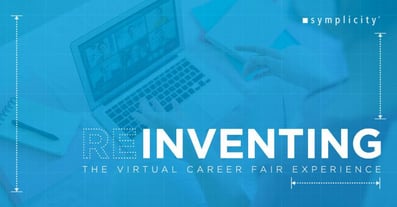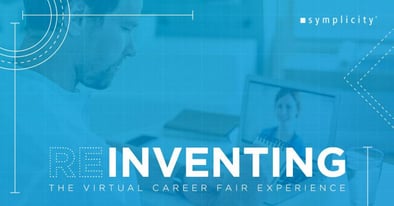A Consultant’s Perspective: Recommendations for Hosting Successful Virtual Career Fairs
The concept of virtual career fairs initially came into play as an effort to facilitate an alternative approach to career fairs for students who were located in remote regions and as well as a means of reducing travel costs for employers looking to hire students in other regions. Virtual Career Fairs have been taking place for several years now, some with greater success than others. During times of COVID-19, 99% of educational institutions who previously organized on-site company presentations, workshops and career fairs are now looking to convert their service offering to a virtual format. Many Symplicity clients, like several other higher education institutions, rapidly transformed their academic offering and student services to a virtual model. There are some Symplicity clients that have taken a step further by virtualizing their career fairs instead of cancelling their in-person events.
When it comes to choosing a virtual career fairs solution, however, many institutions struggle to overcome the pitfalls of tool features or set price. Below is a set of four critical success components that we recommend educational institutions need to address when designing, implementing and evaluating a virtual career fair:
1. Platform User Experience and User Friendliness
Ease of use, responsive design, quick load times and gamification where possible are some of the recommended practices when evaluating the user friendliness of a user interface.
Before the event, we recommend institutions perform multiple tests as well as conduct dry runs of the fair with various scenarios. We also recommend institutions create and distribute detailed and well-documented instructions to all key stakeholders on how to access the fair the day-of and how to perform a quick test to see if their browser or terminal is fully compatible.
During the event, quick support is adamant to maintain engagement and reduce frustration. We recommend institutions designate a support team to manage any potential incoming queries from students and employers with regards to navigating the solution.
After the event, the solution should provide access to reports on the most accessed areas of the solution, clearly indicating the features that were perhaps not promoted sufficiently or did not provide the expected user experience.
2. Student Engagement
Before the event, we recommend a targeted communication campaign take place to inform students about the upcoming fair. Apart from key dates and times, the campaign should point out to students the necessary steps to express their interest to attend, which employers will be attending that may be of interest to them as well as any technological requirements.
As with any other career fair, career centers can already begin to prepare the students for the upcoming fair by evaluating CVs, preparing students for their elevator pitch as well as guiding them towards the necessary research on the employers attending. Here is a checklist of 10 areas that students should review before the career fair takes place. According to this study, students feel more satisfied from the experience of attending a Virtual Career Fair when they are able to see opportunities that match their profiles from industries they are interested in and when they are able to interact with employers directly as much as possible. Facilitating one-on-one interactions with employer contacts in real-time chat and via video conferencing is a critical component of increasing student satisfaction and engagement.
After the event, we encourage career centers to survey students who attended to capture their feedback and possible areas of improvement. Applying this feedback will improve the next career fair so it aligns with student expectations better.

3. Employer Engagement
Educational institutions are required to show employers that they understand the challenges they are facing when they look to hire students and graduates in the virtual world. Engage with your target employers with a powerful communication campaign related to your upcoming virtual career fair. You should highlight in this campaign understanding the challenges and recruitment needs of your employers and how your upcoming fair addresses them.
We also encourage employer contact to register through a configurable event registration form capturing the information that your institution requires for reporting and tracking purposes. One study found that some of the challenges that employers faced in online career fairs included:
- Lack of online engagement
- Lack of clear guidelines and
- Difficulties in correctly identifying the talent they were seeking
We recommend career centers ensure that the solution is not only able to shortlist candidates and promote specific employers to students according to their preferences and profiles, but also send tailored resume books to employers based on their hiring needs. At all times, and similarly with student engagement, instant support to user experience issues is fundamental to keep the contact engaged. We recommend a dedicated staff member is on standby during the fair to provide immediate to support to employers through a direct contact channel where needed.
Online surveys are growing in popularity and form a major force in understanding perceptions and the overall online user experience. We recommend career centers send out personalized online surveys to employer contact participants immediately after the event finishes. Additionally, strengthening the employer engagement with the institution after the event would include sharing the profiles or resumes of the student who attended the fair and have indicated an interest in the employer accounts and its opportunities. It is highly likely that during a career fair, a student did not get the opportunity to interact directly with all the companies they wanted and therefore this would provide them an additional opportunity to gain visibility with these recruiters.
4. Metrics & Data
Whatever approach or tool an institution chooses, it needs to provide them with the ability to quantify the activity of key stakeholders, engagement and the overall satisfaction. Business Intelligence capabilities are required to be able to improve decision making for future initiatives. After a career fair has taken place, it is fundamental for the career centers to be able to easily pull reports related to visibility, engagement, interactions between students and employers in a structure format.
Particular metrics you may focus on among others are:
- Total Number of logged in students
- Unique student logins
- Number of contacts
- Number of interactions between students and employers
- Number of group chats
- Number of job posts targeted during the fair
Apart from a powerful reporting engine that measures each interaction, these tools are required to provide access to an online survey that can be immediately sent out to participants. Virtual career fairs may become the stand in recruitment practices which is why it’s critical for educational institutions to carefully evaluate any technological solution they choose to adopt with a long-term vision that complies and feeds into their institutional IT governance.

Exciting Symplicity Updates
The Symplicity team, through its CSM roadmap, has been releasing critical features and updates to its existing capabilities four times a year. Symplicity is proud to announce that we’re rolling out a NEW virtual career fair management tool for universities this summer as part of Symplicity CSM. This capability will be available to all existing CSM clients and will also be available as a stand-alone solution.
If you would like to find out more about how Symplicity can help you successfully organize a virtual career fair or how you could virtually transform your existing student services offering, please reach out to your client manager. For more information about virtualizing student services, email info@symplicity.com or schedule a conversation.

